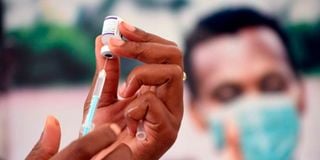Lurking killer: Silent Covid ravaging Kenyans

A health worker prepares to administer Covid-19 vaccination.
What you need to know:
- The country has detected an offshoot of the Omicron variant called the JN.1.
- The JN.1 is classified by the World Health Organization as a variant of interest.
Doctors are raising an alarm over a surge in respiratory infections in the country, with some health experts attributing this to a resurgence of Covid-19.
Surveillance data of positive SARS-Cov-2 (coronavirus) samples taken in the lake region shows that the country has detected an offshoot of the Omicron variant called the JN.1 as well as the H1N1 influenza (sometimes called the swine flu).
The JN.1 is classified by the World Health Organization as a variant of interest, and was first reported in August 2023. Studies on this variant show that it is mostly detected in travellers and wastewater.
“The ongoing proliferation of JN.1 indicates that the variant is perhaps more contagious or possesses a higher ability to evade our immune defences compared to other variants already in circulation,” explains a study published in Environmental Health Insights earlier this year.
Dr Shem Otoi, a Covid-19 waves modelling expert, said that the surge is not surprising as this has been observed before.
“When we look at past data from our modeling, the periodicity and seasonality of waves happening now could identify this period as a peak of Covid-19, only that this could be a mild one,” he said.
Dr Ahmed Kalebi, an independent consultant pathologist, agreed that there has been a surge in respiratory illnesses over the past two weeks and that many people are suffering from flu-like symptoms: cough, throat and chest pain and runny nose.
“These are signs and symptoms of an ongoing outbreak of viral respiratory infection. However, it is not unusual or unexpected as we are now in the flu season,” said Dr Kalebi.
He explained that while the Ministry of Health is not conducting testing or surveillance at the population level, it is still possible that some Kenyans may be self-testing at home using the antigen test kits.
However, the numbers may be few, due to the pricey nature of the tests.
“We might never know fully whether there is an upsurge of Covid-19 cases as no population surveillance is going on. In other countries like the USA they can track through surveillance testing on sewage water” said Dr Kalebi.
He asked the Ministry of Health to share data more regularly and update the public with evidence to allay fears as well as to inform public health measures.
He also called on the public to be cautious—those with symptoms to stay away from others to minimise spread, wash hands frequently and practice hygiene.
Sultani Matendechero, the deputy director-general for health at the Department of Public Health and Professional Standards, said that surveillance in the country shows that Covid-19 infections are still on the decline, but urged the public to go for boosters.
“We still have the Covid-19 vaccine and people should take advantage of it. Covid-19 is still being transmitted,” he said.
Dr Matendechero added that after a steady decline in infections for more than a year, the ministry had adopted passive surveillance to track cases, a move he said was prompted by consecutive low positivity rates of below 5 per cent.
Report by Hellen Shikanda, Mercy Chelangat, Linet Owoko




